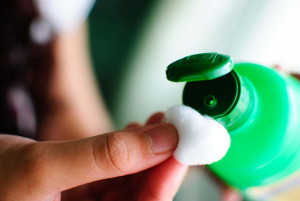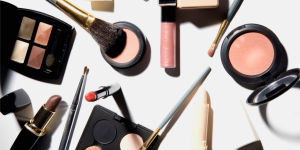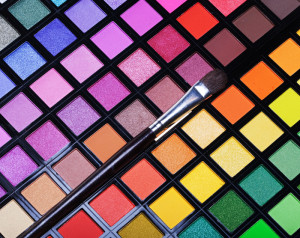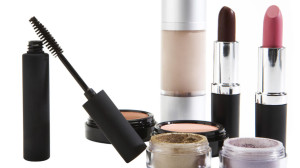
Start Your Own Empire
Manufacturing Cosmetics, Makeup, HairCare,
Sanitizers & Detergents
The Great Cosmetics Conspiracy - Part 2 ... Start your Own Business
Making cosmetics, toiletries and detergent is a multi-billion dollar global industry – full of intrigue and conspiracies. Conspiracies to keep outsiders out!
 Because there’s so much everyday profit in cosmetics manufacturing and making detergent (1000%, if not a whole lot more), the multi-national fat-cat conglomerates want to keep it all for themselves – but that’s also why there’s plenty of opportunity for you to enter the market and make a killing.
Because there’s so much everyday profit in cosmetics manufacturing and making detergent (1000%, if not a whole lot more), the multi-national fat-cat conglomerates want to keep it all for themselves – but that’s also why there’s plenty of opportunity for you to enter the market and make a killing.
Apart from trying to keep their formulations away from the eyes of the general public (you) and contributing to many of the myths surrounding this industry, cosmetics manufacturing and detergent manufacturing companies also do their best to conspire to make enemies of the retailers who sell their products.
News out this week announced that the Spanish National Competition Commission has issued fines totaling $70 million USD to eight cosmetic manufacturing companies – for price fixing of hair products.
Nicknamed the G8, a group of eight cosmetics manufacturing companies formed a cartel back in 1989, and were meeting twice a year to discuss market strategies, including pricing.
So, who are these naughty companies? The Commission found the main offenders to be cosmetics manufacturing giants L’Oreal and Procter & Gamble (the subject of my previous blog entries here and here).
L’Oreal was slapped with the fattest fine of all – $31 million USD – just small change for a conglomerate of its size, but nonetheless not good for its image.
Another company, Productos Cosmeticos SLU, which has been owned by L’Oreal since 2004, was ordered to pay $15 million USD.
If that’s not bad enough, the Spanish industry association, The National Association of Perfume and Cosmetics, which presumably exists to protect the interests of all cosmetics manufacturing companies, was also found to have played a key role in the cartel, and received a hefty fine. Conspiracy? What conspiracy???
So, how did the National Competition Commission find out about this?
Seems the whistle blower was one of the cartel members, Henkel Iberica. Under a law passed in 2008, it is free from prosecution in return for supplying details of the cartel’s activities.
I can see a movie script developing here … The Shampoo Mafia …
Still in Spain, last year personal care product giants Sara Lee, Colgate-Palmolive and Puig received fines totaling some $12 million USD (again, just pocket change).
Seems these three had their own little cartel since 2005, whereby they “disguised” a price hike of over 15 % on bath and shower gel products. By reducing the capacity of bottles without altering the price of the products, they were able to cover up an increase in the unit price.
Over to France, and some of the world’s biggest names in cosmetics manufacturing found themselves in hot water – for price fixing of perfumes.
Late last year, the French courts found that luxury brands including L’Oreal (again), Marionnaud, LVMH (which owns Sephora and Nocibe), Chanel, Christian Dior, Guerlain, YSL and ELCO (Estee Lauder and Clinique) were engaged in anti-competitive activity.
The French courts found that all these brands had collectively entered into an agreement with distributors which ensured that all products would be retailed at a single price, thereby eliminating any possibility of competition among retail stores.
The distributing companies were the hardest hits with fines – Marionnaud $18 million USD, Sephora $14 million USD, Nocibe $9 million USD.
Back in mid-2008, the German Federal Cartel Office fined international cosmetics manufacturing companies for exchanging information about sales, advertising costs, price increases and product launches. The companies included many of the usual suspects – L’Oreal (again), Chanel, Clarins, Cosmopolitan Cosmetics (now P&G), Coty, Lancaster, Estee Lauder, LMVH, Sheisedo, YSL.
The companies, which met four times a year since 1995, were fined between $375,000 USD and $3 million USD.
Earlier in the same year in Germany, Sara Lee (again), Unilever and Henkel were collectively fined over $50 million USD for forming a price fixing cartel. Colgate Palmolive was also in on the deal but, like Henkel Iberica, avoided fines by spilling the beans to German authorities.
The group colluded to increase the prices of toothpaste, shower gel and dishwashing liquid by 5%, and prevented retailers from resisting the increase.
So, what does all this mean for you – the aspiring cosmetics manufacturer and/or detergent manufacturer?
The French Commission referred to the price-fixing as a pricing control system that involved “checks on the prices practised, and pressure and threats of commercial retaliation against any distributor who refused to apply the prices imposed by the brand.”
This is the reason that many major retailers – from supermarkets to pharmacies and department stores – don’t like the stand-over bullying tactics of the major cosmetics manufacturing and detergents manufacturing companies. Providing the quality is good, price is comparable and the supply guaranteed, many would much rather deal with smaller manufacturers – like you.
This is also the reason that many major retailers have joined forces with private label cosmetics manufactures and private label detergent manufacturers. They promote their own brand and develop their own customer loyalty, instead of promoting the brands of the multi-nationals who continually conspire against them.
And this is a great opportunity for you to make cosmetics and make detergent under these companies’ own labels – as well as your own.
In addition, the major cosmetics manufacturing and detergent manufacturing companies focus their efforts only on big accounts. They completely overlook hundreds of hungry, untapped markets – this is where you can fill some mega-profitable niches which have virtually zero competition.
Want to know about how to make makeup, make cosmetics and make detergent? Head over to the AustraLab website.

Subscribe Now – Receive the lastest news & updates from AustraLab
You might also like ...

How To Make Skin Tonics & Astringents
Start Your Own EmpireManufacturing Cosmetics, Makeup, HairCare,Sanitizers & Detergents Making Astringents & Skin Care Tonics … Start your Own Business Click here to learn the

Cosmetic Chemistry – How To Make Makeup & Skin Care
Start Your Own EmpireManufacturing Cosmetics, Makeup, HairCare,Sanitizers & Detergents Cosmetic Chemistry … How to Start your Own Business Click here to learn the trade secrets

Cosmetics Business – Make Your Own Makeup, Start An Empire
Start Your Own EmpireManufacturing Cosmetics, Makeup, HairCare,Sanitizers & Detergents Start Your Own Cosmetics Business … Start an Empire Click here to learn the trade secrets

Make Mineral Makeup – Million Dollar Makeup
Start Your Own EmpireManufacturing Cosmetics, Makeup, HairCare,Sanitizers & Detergents Making Mineral Makeup … Start your Own Cosmetics Business Click here to learn the trade secrets

Make Eye Makeup
Start Your Own EmpireManufacturing Cosmetics, Makeup, HairCare,Sanitizers & Detergents How to Make Eye Makeup … Start your Own Business Click here to learn the trade

How To Make Makeup – 5 Questions
Start Your Own EmpireManufacturing Cosmetics, Makeup, HairCare,Sanitizers & Detergents How to Make Makeup … Start your Own Business Click here to learn the trade secrets

The Great Cosmetics Conspiracy
Start Your Own EmpireManufacturing Cosmetics, Makeup, HairCare,Sanitizers & Detergents The Great Cosmetics Conspiracy – Part 1 … Start your Own Business Click here to learn

Cosmetic Ingredients – How One Essential Oil Created a Billion Dollar Empire
Start Your Own EmpireManufacturing Cosmetics, Makeup, HairCare,Sanitizers & Detergents Cosmetic Ingredients … How One Essential Oil Created a Billion Dollar Empire … Start your Own

Private Label Cosmetics – Why you need your Own Brand
Start Your Own EmpireManufacturing Cosmetics, Makeup, HairCare,Sanitizers & Detergents Private Label Cosmetics – Why You Need Your Own Brand … Start your Own Business Click

Cosmetics Manufacturing – Start Your Own Business – Think Outside The Square
Start Your Own EmpireManufacturing Cosmetics, Makeup, HairCare,Sanitizers & Detergents Cosmetics Manufacturing … Start your Own Business Click here to learn the trade secrets of manufacturing

© 2019 AustraLab
3 Responses
Interesting read, I’d like to join up sometimes soon so I can start my own business and make shampoo and other hair care products, it sounds exactly what I’m looking for. I’ve learned a lot about the cosmetics manufacturing industry from reading your blog and iI think it sounds exciting.
Thanks Zenda – I’m glad to have ben able to provide you with some worthwhile information about making shampoo and hair care products.
Hi Sam,
It is showing more difficult then not to actually find a make-up chemist. I was a celebrity hair/make-up artist in the entertainment industry for over 20 years, but it has been my experience as a woman that has led me to want to develop a product that does not exist. I really want to speak to a chemist and find out how to go about doing this. Do you think you can help me?
Sincerely,
Joy